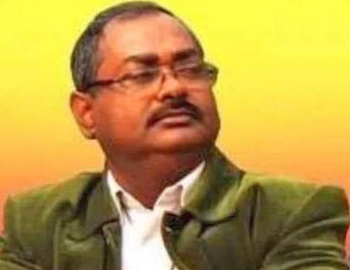Asansol, Jul 12: A senior functionary of Bharatiya Janata Party, who allegedly posted fake images and video on social media to create communal tension, has been arrested by the Criminal Investigation Department (CID).
 The arrested has been identified as Tarun Sengupta, BJP’s information technology cell secretary from Asansol, West Bengal. Sengupta is the third person to face action since Sunday on similar charges.
The arrested has been identified as Tarun Sengupta, BJP’s information technology cell secretary from Asansol, West Bengal. Sengupta is the third person to face action since Sunday on similar charges.
West Bengal chief minister Mamata Banerjee has lashed out at the BJP for floating misleading and fake pictures on social media with an eye on triggering communal violence.
During the week, FIRs were lodged in Kolkata against a BJP spokesperson in Delhi. Police also arrested a man from Sonarpur for posting ‘fake’ pictures claiming those to be taken in Basirhat that was rocked by communal violence last week.
Non-bailable sections of IPC were slapped against Sengupta in Suri police station of Birbhum district. He will be produced in Suri court on Wednesday. According to CID sources, Sengupta posted a video a few weeks ago. He was arrested from Hirapur in Asansol.
“The people of Bengal will not tolerate the fact that BJP is using social media platforms by posting fake pictures and fake news to meet their political ends,” Mamata Banerjee said while addressing a public meeting in East Midnapore district on Monday.
On the same day, Kolkata Police registered two non-bailable cases against Nupur Sharma, a BJP spokesperson in Delhi, for sharing on social media a photo of the 2002 Gujarat riots and claiming it to be an image captured during the communal violence at West Bengal’s Basirhat last week.
The cases were registered at Gariahat and Regent Park police stations under five sections of the Indian Penal Code.
On Sunday, a Hindu man was arrested from Sonarpur in South 24 Parganas district by the Cyber Crime Cell of Kolkata Police for posting a still photo from a Bhojpuri movie and passing it off as one captured in Baduria near Basirhat in North 24 Parganas. The photo showed a group of men (actually actors) trying to molest a woman (an actress). This photo, too, was shared by several BJP leaders.
Mamata Banerjee has already announced that a judicial inquiry headed by a retired judge of the Calcutta high court will be conducted to find how the communal flare-up in Basirhat was instigated.
“The purpose of this inquiry is to identify those who instigated the violence and spread fake news on social media, using clippings and stills from a movie and of violence that took place in other places, even Comilla in Bangladesh,” the chief minister said.




Comments
Haj khidmat visa
Haj khidmat visa mobile no. 8081308289
Add new comment